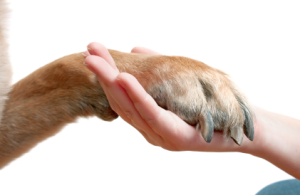 In a world where everything must be cheap, quick and easy, we look for the best deal and for the cheapest and fastest ways to fill our needs. We’re not just shaped by culture and industrialization. In fact, the reason why we buy into this way of life so willingly is that conserving energy is a biological drive that we share with all other species. We wouldn’t have survived if we couldn’t figure out that by taking the shortest road, we’d get to food or shelter with less risk of running out of energy or being killed. No wonder that we then fall for marketing messages that trigger our desires to work less for what we want. With industrialization however, we’ve enabled practices that more than ever, benefit some at the expense of others. Buying a puppy from a pet store, training and management devices that offer quick fixes or supermarket pet food, all fulfill our needs to get what we want, for less effort. But as Hamilton Holt once said: ‘Nothing Worthwhile comes easy’ and this is especially true when working with animals. No matter the species, teaching animals to live in our care requires time, patience, psychology and stamina. There is no quick fix. Owning a dog, or any animal, requires effort, energy and money. When working as a professional trainer, our job is to help guardians shift their expectations and develop a more realistic approach to their pets’ needs.
In a world where everything must be cheap, quick and easy, we look for the best deal and for the cheapest and fastest ways to fill our needs. We’re not just shaped by culture and industrialization. In fact, the reason why we buy into this way of life so willingly is that conserving energy is a biological drive that we share with all other species. We wouldn’t have survived if we couldn’t figure out that by taking the shortest road, we’d get to food or shelter with less risk of running out of energy or being killed. No wonder that we then fall for marketing messages that trigger our desires to work less for what we want. With industrialization however, we’ve enabled practices that more than ever, benefit some at the expense of others. Buying a puppy from a pet store, training and management devices that offer quick fixes or supermarket pet food, all fulfill our needs to get what we want, for less effort. But as Hamilton Holt once said: ‘Nothing Worthwhile comes easy’ and this is especially true when working with animals. No matter the species, teaching animals to live in our care requires time, patience, psychology and stamina. There is no quick fix. Owning a dog, or any animal, requires effort, energy and money. When working as a professional trainer, our job is to help guardians shift their expectations and develop a more realistic approach to their pets’ needs.
In his presentation at the last APDT conference, Ken Ramirez, renown animal trainer and executive vice-president of animal care and animal training at Chicago’s Shedd Aquarium shared his passion for animal training. Training for Ken is about animal welfare. It’s not just about the behavior, it’s about teaching the animal how to live in a human environment, with its limitations, rules and constraints. Animal training is about teaching guardians, the caregivers, who struggle to understand why Fido is destroying their backyard, barking incessantly or biting. Just like a mother will teach her offspring how to find food, the trainers job is to assist guardians in teaching their beloved canine where to potty, what to chew on, what to do when visitors come at the door, how to behave when restrained by a leash, that they won’t die when left alone, that jumping or putting teeth on people isn’t acceptable, that they can only eat the food that’s given to them, that socks aren’t play toys, etc… Training often falls at the bottom of most people’s priority list and is mostly considered a luxury, something that we’ll get to when we have time or money. Again, our need for quick, easy and cheap gets in the way of doing what’s necessary. Fido’s teaching must be a given, something that we all expect to do when adopting or buying a dog. ‘No one should think that not training your animal is appropriate’.
 Whether we train dogs, horses, cats or exotic species, our job is to benefit the animal we’re working with, making sure his/her needs are met. When the animals are healthy and happy, they have less anxiety and stress. They’re easier to manage and train. Everyone benefits. Most guardians have a deep attachment to their pets, a love that can be as strong as the one they would share with another person. Through television and Internet, they look for solutions and access information that they won’t necessarily understand or know how to apply. Partial information is often worse than no information at all.
Whether we train dogs, horses, cats or exotic species, our job is to benefit the animal we’re working with, making sure his/her needs are met. When the animals are healthy and happy, they have less anxiety and stress. They’re easier to manage and train. Everyone benefits. Most guardians have a deep attachment to their pets, a love that can be as strong as the one they would share with another person. Through television and Internet, they look for solutions and access information that they won’t necessarily understand or know how to apply. Partial information is often worse than no information at all.
‘What do you mean you don’t have a magic wand? Can’t you just fix the dog?’ Many expect quick fixes of their pets’ problems, but in the end what we’re really applying is a change in the guardians habits. Much like a salesman, we have to convince them that learning about the animal they chose to bring into their household is worth their time, effort and money. Many endure years of putting up with behavior problems. Unless they understand how much emotional stress and anxiety their animal is experiencing, dealing with the issue may be low on their priority list and the effort they will be willing to put into the treatment may be minimal.
Long held truths, beliefs about dogs, about certain breeds or labels can be used as excuses that come in the way of solutions. ‘My dog is stubborn’, ‘this breed does X’, ‘my dog hates other dogs’. Labels keep us from the solutions, from looking for triggers and accepting responsibility. The dogs should know better, is doing it on purpose, is trying to punish… I’m only speaking for dogs here, but this holds just as true for other species, like horses, birds or cats. A large part of our work is to help guardians open up to a different perspective, understand the animal from their side and take responsibility. This is where communication skills and most importantly negotiating skills are critical. This is also where many trainers struggle. We’re great at applying our science and skills to animals, but when it comes to humans, it’s easy to go back to long learned social habits.
Applying positive reinforcement works best with humans too, insists Ramirez. We need to speak their language, understand their perspective, dropping the training jargon. We may hurt their feelings while criticizing other methods or perspectives, leading them to disengage and shut down. When we understand what motivates other people, whoever they are, clients, spouse, children or boss, we can apply positive reinforcement very successfully. Everybody is different and some may be motivated by saving money, saving time, effort, a clean house, their spouse, their ego being stroked, etc. Finding out what they really care about is critical in order to be able to reinforce their effort.
As animal trainers, we spend hours observing animals playing, interacting, working, etc. Ultimately, there comes a time where unless we shift our focus to studying the people, our piers and loved ones, we won’t be able to help the animals we care so much about.
It doesn’t matter that we’re the best trainer in the world, if we can’t help the guardians achieve their goals, support their effort, no matter how big or small, coach and encourage them every step of the way, we won’t be able to help the animal. Our real purpose in most cases is to supervise those who will carry out the behavior modification protocols.
Caring and inspiring, Ken Ramirez reminds us that as passionate as we might be about research, dog sports, competition and other animal related field, our first priority is with the animals and their guardians. As long as we euthanize over 8 million pets annually in the US alone, the need for animal trainers and behavior consultants is immense. As passionate animal advocates, part of our job is to educate and reinforce the idea that all pets need to learn how to live in a world organized around the human needs. The more we develop our human skills, the more animals we can help.
Jennifer Cattet Ph.D.
Related articles








I love this post! Thank you for sharing such excellent information! When I was still working, I was in Customer Service. And I can tell you from experience that no matter what kind of work you do, it is still customer service, whether you work with non-human animals or the human specie. There’s no getting away from it. So, I’m glad you said what you did about needing to be able to help humans in order to effectively help their dogs. Some people just don’t “get it”. And some don’t want to try because they’re just not “people persons”.
Callie,
Thanks so much for your interest in Pet Tutor(TM)! The response has been overwhelming and we are so thankful to everyone who has asked to be involved. There are several on the waiting list, but availability will depend on many factors so I would just suggested that you send an email to amanda@smartanimaltraining.com if you are interested. Thanks and be sure and signup for our newsletter for new announcements on Pet Tutor(TM). see http://www.smartanimaltraining.com Thanks! -Wes
I want to remind people that animal welfare does not discriminate. Meaning, to avoid being hypocritical, and to support ALL animals, someone wouldn’t praise dogs and cats and in the same breath eat pigs and cows…etc. anyone who trumpets and supports animal welfare would/should be vegan. Introspection time…